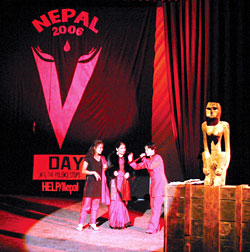|
|
HELP/Nepal\'s production of The Vagina Monologues undercut the very values the NGO claimed to promote by putting it on. Instead of a message of empowerment, Friday\'s performance in Kathmandu often delivered precisely the opposite.
The Vagina Monologues is a series of short plays based on author Eve Ensler\'s interviews with many women. The monologues aim to fight violence against women and its destructive political, social, and economic consequences by celebrating women\'s sexuality and strength. In one of the plays, characters discuss what their vaginas would wear if they got dressed. At first they imagine silly, fun things�"silk stockings," "jeans," "emeralds". Then one says, "An electrical shock device, to keep unwanted strangers away." The message is one of ownership: nobody else has any right over my vagina. It is also one of outrage and anger at the fact that a woman\'s body is not always treated as her own. In HELP/Nepal\'s translation, this sentence becomes something like "Euta current laune aujar, ta ki mero shreemaan bahek kohi auna napaos." "An electrical shock device, so nobody but my husband can enter." Ownership is taken from the woman and laid at someone else\'s feet, undoing the message of the original completely. One of the most common forms of violence against women is abuse by a male partner, but domestic violence and marital rape are ignored here. 
When the same characters turn to wondering what their vaginas would say if they could talk, Friday\'s production had them say things like "timrai na ho"�"it\'s yours anyway"�to an unnamed partner. Such phrases were absent in the original. Why did the translators feel it necessary to include them? Why, in an entire fleet of actors, directors, and NGO workers, did nobody point out that these statements go completely against the spirit of the cause they claim to espouse? How did HELP/Nepal\'s production come to say such harmful things, all in the name of women\'s empowerment?
Despite such massive shortcomings, the production does draw attention to a number of important issues that receive painfully little public exposure. As HELP/Nepal takes it to other venues, it will be good for people to hear discussed on stage things that are usually treated with silence. Hopefully the inadequacies themselves will provoke debate. But the fact that such disempowering messages remain in a performance meant to be a celebration of strength is indicative of just how much we need�and how unaccustomed we are to�assertions of women\'s strength and independence.



